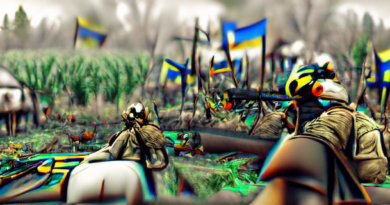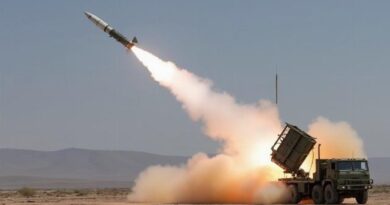Ukraine. Biden on the Long Fight Ahead: “This battle will not be won in days or months”, “Putin cannot remain in power.”
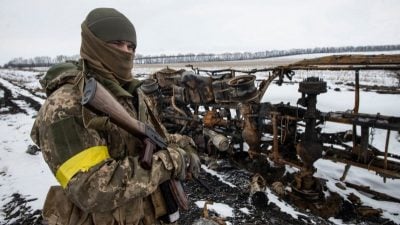
Joe Biden “sparked a global uproar” on March 26, declaring Russian President Vladimir Putin “cannot remain in power.” He also said “this battle will not be won in days or months, either. We need to steel ourselves for the long fight ahead.”
This was public confirmation that the U.S. goal in Ukraine is “regime change” in Russia, no matter how long, or how many Ukrainian and Russian lives it may take—or how many people become refugees, or how the world economy will be damaged.
“The words of a president matter,” Biden said. “They can move markets. They can send our brave men and women to war. They can bring peace.” In this case Biden’s words helped move markets for the military-industrial complex and big U.S. energy companies. They were not intended to bring peace.
Biden’s remarks came after a triple summit in Brussels of NATO, the European Union and the G7 big capitalist countries. There he “coaxed a display of unity” among U.S. allies, but “limited practical outcomes… underlined the limited options,” according to Agence France Presse-AFP. European powers stopped short of sanctions against Russian gas supplies, the report said, “fearing the consequences for their own energy security.”
“Why I asked for this NATO meeting,” Biden said, “is to be sure that, after a month, we will sustain what we’re doing, not just next month, the following month, but for the remainder of this entire year,” according to the AFP report. Speaking afterwards in Warsaw, Poland, Biden expressed the aggressive tone he hoped for in Brussels – to fire up his most militant NATO ally, and chat with members of the U.S. 82nd Airborne Division stationed there.
PR War “Off Message”
Biden’s statement “went further than even U.S. presidents during the Cold War,” according to a Washington Post report: It “immediately reverberated around the world as world leaders, diplomats, and foreign policy experts sought to determine what Biden said, what it meant—and, if he didn’t mean it, why he said it.” White House aides “were adamant the remark was not a sign of a policy change.” But “they did concede it was… off message,” the report said.
Message control is a key weapon for U.S. war planners and their Ukrainian clients. CIA Director William Burns testified March 3 that “we have had a great deal of effect in… demonstrating to the entire world that this is premeditated and unprovoked aggression…” The effort involves a super-professional message management operation, described by Dan Cohen, that “has produced a steady stream of sophisticated propaganda aimed at stirring up public and official support.” The international effort is led by PR Network of the UK.
The PR campaign helped the Ukrainian Foreign Ministry produce a set of “key messages.” It ruled out use of the terms “civil war in Donbas,” “internal conflict,” “conflict in Ukraine” and “Ukrainian crisis” to describe the Ukrainian government’s war against the secessionist republics of the Donbas region. The UN Human Rights Office estimates that 14,200 people, including 3,404 civilians, have been killed in combat in eastern Ukraine since 2014.
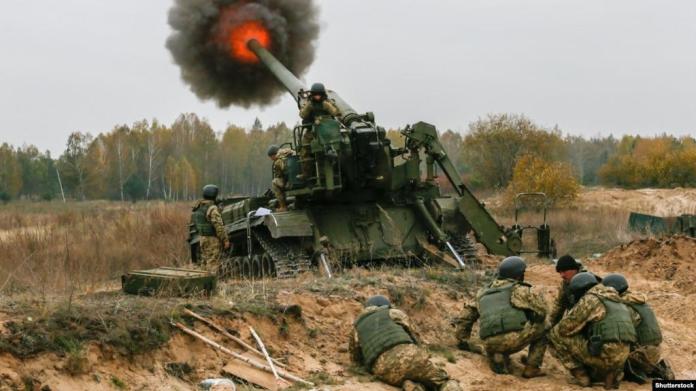
Ukrainian army shelling Donetsk (Source: Shutterstock)
Recent U.S. Regime Change Wars
U.S. message managers try to avoid comparison to recent U.S. regime change wars in Iraq, Afghanistan, Libya and Yugoslavia. It was 23 years ago that NATO countries, without UN Security Council authorization, ordered attacks on Yugoslavia—NATO’s first target in Europe after the collapse of the USSR. The air strikes lasted 78 days, from March 24 to June 10, 1999.
About 1,000 NATO aircraft hit Serbia and Montenegro with thousands of cruise missiles and 80,000 tons of bombs, killing thousands and destroying countless buildings, hundreds of miles of roads, railroads and airfields, bridges, schools and hospitals. It also bombed the Chinese embassy in Belgrade, killing three Chinese citizens.
The Chinese government protested vigorously without escalating the crisis, getting a U.S. apology and several million dollars of reparations.
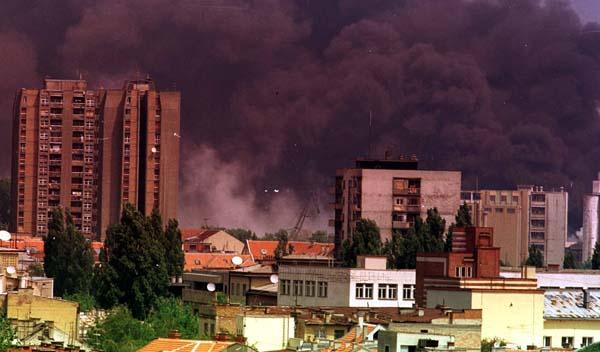
The Yugoslav city of Novi Sad on fire after U.S.-NATO bombing in 1999. [Source: wikipedia.org]
“This war did not come out of nowhere,” commented Serbian filmmaker Emir Kusturica. “This is a continuation of something sown long before. You can see the continuity of Russophobia in the West.” He added that NATO’s military intervention was followed by a color revolution that led to the overthrow of Yugoslav President Slobodan Milosevic. The same coup strategy was then used in Ukraine in 2004 and 2014. NATO’s objective was the disintegration of the Yugoslav state. This is happening now against Russia, Kusturica said.
Biden’s message includes intense demonization of the Russian President, calling him a war criminal and a “butcher,” among other things—not likely to facilitate peace talks. That has not been the top priority for Washington, which has used Poland as a prime staging area for countless tons of military hardware, as well as mercenaries recruited from around the world.
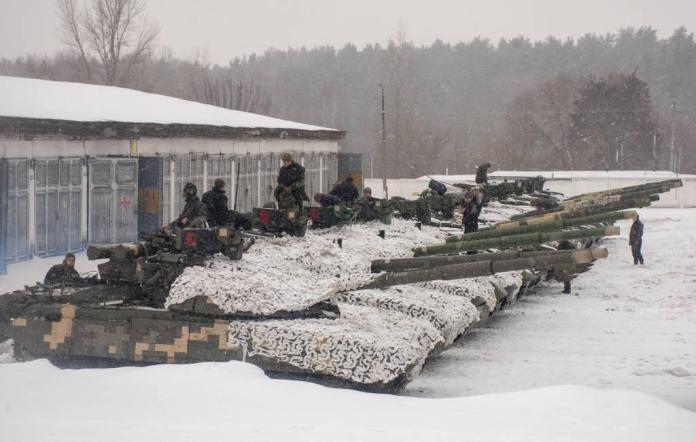
Tanks and other weapons in Poland destined for Ukraine. [Source: defensenews.com]
New Round of Peace Talks
Russian and Ukrainian delegations will hold a new round of face-to-face negotiations between March 28 and 30, reported China’s Xinhua news agency. Since February 28, the two sides have held three rounds of face-to-face peace talks and a series of online discussions, failing to reach a major agreement.
The new round of talks will take place after the Russian military announced on March 26 that “the main tasks of the first stage of Russia’s special military operation in Ukraine had been completed.” That stage focused on securing eastern Ukraine’s Donbas region, demilitarizing and denazifying Ukraine as Russia’s priorities—not taking Kyiv or other cities outside eastern Ukraine. The U.S. has interpreted the Russian message as a “scaling back” of its original war objectives. It could also be interpreted as a new opportunity for peace.
Some observers have said China could play an effective mediator role in peace talks, since it has substantial trade with all parties—Russia and Ukraine, the EU countries and the U.S. China has “Belt and Road” projects in numerous European countries, including Ukraine, giving it an interest in an early resolution to the conflict. But U.S. pressure on China to “switch sides” against Russia complicates the issue.
The Chinese newspaper Global Times editorialized March 27 that “NATO, under the leadership of Washington, is the real initiator and driving force behind the conflict between Russia and Ukraine… What the U.S. really needs is tense and conflicting Russia-Europe relations,” the editorial said. “It is NATO’s eastward expansion that has triggered Ukraine’s desire to join NATO and greatly triggered Russia’s concerns over territorial security, which directly led to the current Russia-Ukraine conflict…”
Global Times raises the question: “do major European countries like Germany and France ‒ also NATO members—really hold a stance over the Russian-Ukrainian conflict that is in line with Washington’s interests? Unlike the past security crises in Europe, the EU will become the biggest victim of the Russia-Ukraine conflict. It will have to bear the brunt of the conflict. Therefore, as the Ukraine crisis develops, the differences between the U.S. and Europe will become inevitable once the public opinion in major EU countries changes.”
NATO leaders at the Brussels summit called on all states, including China, to abstain from supporting Russia’s “war effort,” Global Times reported, “and to refrain from any action that helps Russia circumvent sanctions. They also said China is engaged in spreading lies and misinformation to support Russia.” Chinese Foreign Ministry spokesperson Wang Wenbin said “We oppose groundless accusations and suspicion against China, and will not accept any pressure or coercion.”
A “Permanent State of Precarity”
Economist Michael Hudson agrees with the Chinese analysis, adding that U.S. policy is to control the world, and “to sort of repeat in Ukraine and Europe what it was doing in Syria and Libya.” John Mearsheimer, the noted exponent of the realist school of international relations, says “the West bears primary responsibility” for the disaster in eastern Europe, which “will cause a wrecked global economy.” In the global south, with much of the world’s population, many countries rely on grain imports from Ukraine and Russia, and worry about major shortages caused by supply chain disruptions.
South Africa’s ANC Youth League spokesperson, Sizophila Mkhize, told Breakthrough News on March 25 that “Our countries were invaded, led by the western countries, led by NATO itself; and we did not hear anyone say ‘pray for Libya,’ for instance… They could have avoided this war, like the president of South Africa said. But they’re arrogant, they’re self-serving and they’re selfish. And they don’t care about many of the lives that are going to be lost.” She added that “we have also realized the racism with which the people of Africa who were trapped in Ukraine were treated.” South African President Cyril Ramaphosa has offered to help mediate the crisis.
Ajamu Baraka of Black Agenda Report says
“The war being waged against global humanity by the U.S./EU/NATO Axis of Domination is a hybrid war that utilizes all the tools it has at its disposal—sanctions, mass incarceration, coups, drugs, disinformation, culture, subversion, murder, and direct military engagement to further white power.”
He adds that on the heels of the 2008 financial crash and the crisis of the Covid pandemic, today millions “are experiencing a permanent state of precarity with evictions, the continued loss of medical coverage, unaffordable housing and food costs, and a capitalist-initiated inflation.” He says U.S. rulers hope that “with the daily bombardment of war images, U.S. workers and the poor will embrace rising costs of gas and even more increases in the cost of food.”
The Brown University Costs of War Project estimates that the wars waged by the United States in this century have cost millions of lives, at least $8 trillion and counting, with another $8 trillion that will be spent over the next ten years on the military budget if costs remain constant from the $778 billion just allocated. The Costs of War Project also notes that “38 million people have been displaced by the post-9/11 wars in Afghanistan, Pakistan, Iraq, Syria, Libya, Yemen, Somalia, and the Philippines.” Are the architects of NATO expansion ready to accept responsibility for more huge numbers of Ukrainian refugees?

Source: codepink.org
CodePink’s Open Letter
The anti-war group CodePink says “The U.S., which played a major role in exacerbating the conflict that led up to Russia’s invasion of Ukraine, must now play a major role in the negotiations between Ukraine and Russia to achieve a ceasefire.” It adds that the United States must be ready to make compromises and support negotiations between Ukraine and Russia by committing to the following:
- Rejection of a no-fly zone over Ukraine;
- No NATO expansion;
- Recognition of Ukraine as a neutral country;
- Sanctions on Russia to be lifted;
- Support for an international security agreement to protect the interests of all people on the European continent to remain free from war and occupation;
- Support for Ukrainian demilitarization to the degree that missiles would be banned;
- Supply humanitarian aid to Ukraine and support Ukrainian refugees.
*
Note to readers: Please click the share buttons above or below. Follow us on Instagram, Twitter and Facebook. Feel free to repost and share widely Global Research articles.
Dee Knight is a member of the DSA International Committee’s Anti-War Subcommittee. He is the author of My Whirlwind Lives: Navigating Decades of Storms, soon to be published by Guernica World Editions. Dee can be reached at: [email protected].
Featured image: A Ukrainian servicemen stands by a burned military vehicle near Sytniaky, Ukraine, March 3, 2022. Photo courtesy General Staff of the Armed Forces of Ukraine/Facebook.
This article has been archived for your research. The original version from Global Research can be found here.
